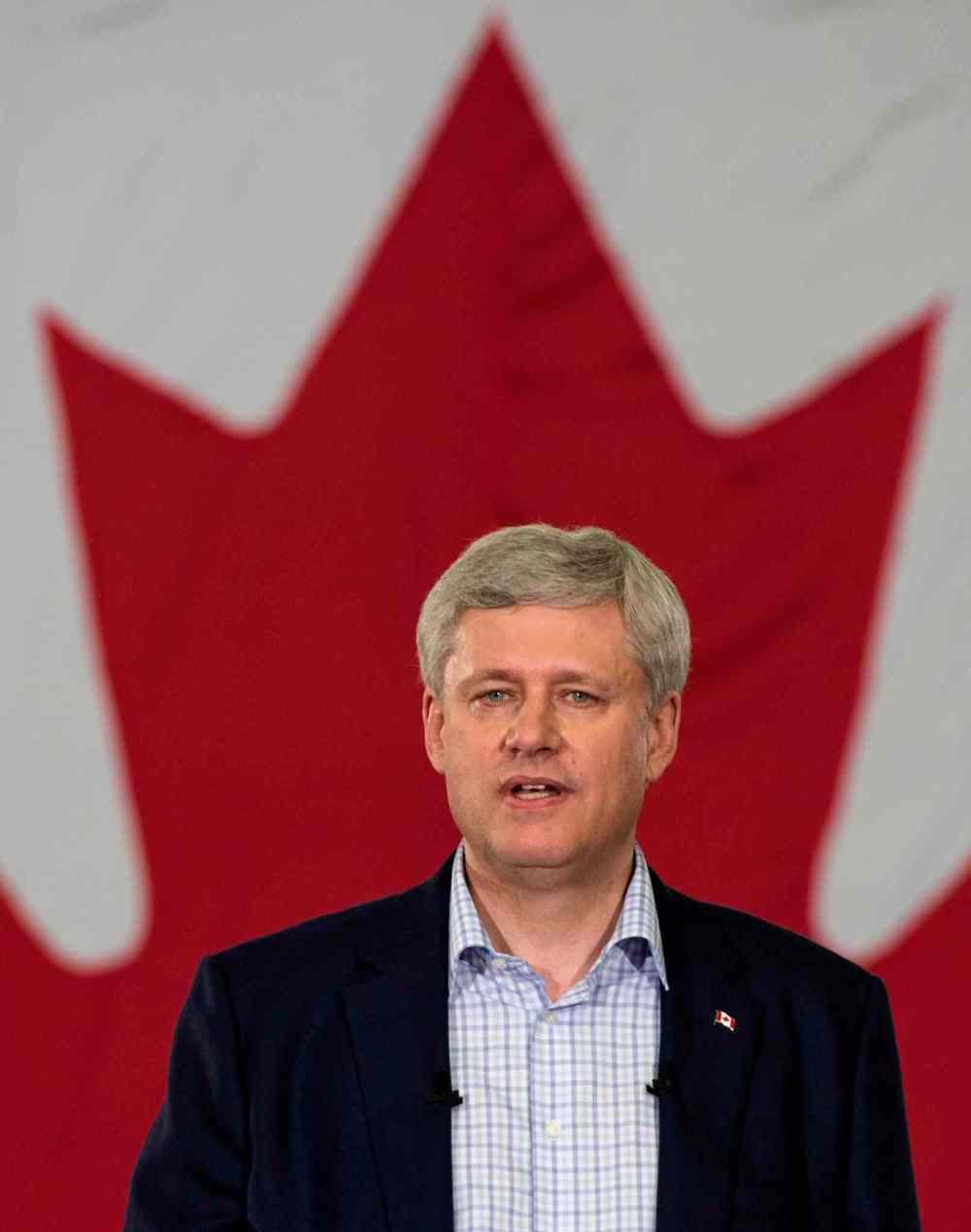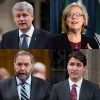Harper’s Hail Mary strategy
Long election could backfire on Conservative game plan
Advertisement
Read this article for free:
or
Already have an account? Log in here »
To continue reading, please subscribe:
Monthly Digital Subscription
$1 per week for 24 weeks*
- Enjoy unlimited reading on winnipegfreepress.com
- Read the E-Edition, our digital replica newspaper
- Access News Break, our award-winning app
- Play interactive puzzles
*Billed as $4.00 plus GST every four weeks. After 24 weeks, price increases to the regular rate of $19.95 plus GST every four weeks. Offer available to new and qualified returning subscribers only. Cancel any time.
Monthly Digital Subscription
$4.99/week*
- Enjoy unlimited reading on winnipegfreepress.com
- Read the E-Edition, our digital replica newspaper
- Access News Break, our award-winning app
- Play interactive puzzles
*Billed as $19.95 plus GST every four weeks. Cancel any time.
To continue reading, please subscribe:
Add Free Press access to your Brandon Sun subscription for only an additional
$1 for the first 4 weeks*
*Your next subscription payment will increase by $1.00 and you will be charged $16.99 plus GST for four weeks. After four weeks, your payment will increase to $23.99 plus GST every four weeks.
Read unlimited articles for free today:
or
Already have an account? Log in here »
Hey there, time traveller!
This article was published 07/08/2015 (3819 days ago), so information in it may no longer be current.
BRANDON — It was a bold choice, but we won’t know until mid-October if it was the right choice.
Reaction to Prime Minister Stephen Harper’s decision to prorogue Parliament and launch Canada’s longest federal election campaign since 1872 has been hailed by some as a tactical masterstroke that enables the ruling Conservatives to maximize the electoral advantages that come with having millions more to spend than their rival parties.
The move has been condemned by others for largely the same reasons. They allege the higher spending limits that come with a 79-day campaign will make the electoral playing field even less level than it already was, with democracy being the ultimate victim. Former chief electoral officer Jean-Pierre Kingsley, for example, has accused the Tories of “gaming the system” and of distorting the role of money in Canadian politics. Others have condemned Harper’s election call as shameless, unfair, cynical, hubristic, unethical and even immoral.

Does the overheated rhetoric match the circumstances? Does the prolonged campaign period and the potential for millions in additional spending really favour the Conservatives?
Pundits and partisans are outraged by the early election launch, but let’s not kid ourselves. The Conservatives haven’t done anything the Liberals and new Democrats wouldn’t do if they found themselves in the same position. Both parties have a long history of exploiting rivals’ weaknesses while in government at the federal or provincial level.
As to the assertion that a longer campaign will benefit the Tories, there are a number of factors that suggest the exact opposite. First, what exactly is Harper going to talk about over the next 11 weeks? He has already warned us to not expect big-ticket spending commitments capable of being implemented immediately. All that leaves is another two and one-half months of the same “fear everything” talking points — a strategy designed to keep votes he has, not win the votes he doesn’t.
With Harper intent on campaigning from within an impregnable security bubble, attending Tory-only events throughout the country, he could go through the entire campaign without encountering an uncommitted voter. Compare that to the campaign style of Liberal leader Justin Trudeau and NDP leader Thomas Mulcair, who each far exceed the PM in charisma and appear to revel in unscripted interaction with ordinary Canadians. Giving Trudeau and Mulcair extra time to campaign gives them more opportunities to connect with voters and win their support.
Second, even if the Tories spend millions more than their rivals on radio, print and television advertising, that investment may not yield positive results. The value of those ads could be largely negated by the impact of social media, Internet platforms such as YouTube and, most importantly, weeks of unflattering news reports regarding issues such as the Mike Duffy trial and the Trans Pacific Partnership negotiations.
Third, and closely related to the previous point, there is ample marketing research that shows overly repetitious advertising can alienate voters. The Conservatives apparently plan to shower Canadians with advertising in the final weeks of the campaign, but there comes a point when carpet-bombing voters with robo-calls and their mail boxes with pamphlets laden with half-true histrionics isn’t effective; it’s just irritating.
Finally and perhaps most importantly, recent polls have revealed almost 70 per cent of Canadian voters desire a change in government. That is far beyond the conventional electoral “tipping point,” and history has consistently shown it is extremely difficult for an incumbent government to reverse the momentum for change when it reaches such a high level.
The Harper Tories are betting this election on the hope they can accomplish that objective through an extra six weeks of intensive advertising that will repeat arguments pro-change voters have already heard, considered and rejected. It’s a Hail Mary strategy that could easily backfire, hardening or even growing support for rival parties.
Incumbent governments almost always prefer short election campaigns because it means fewer days for things to go wrong, and less time for opponents to build momentum. By launching the longest federal election campaign in modern-day Canadian history, Stephen Harper has ignored those considerations.
It is a decision far more risky than it appears. Ten weeks from now, we will know if the gamble was worth it.
Deveryn Ross is a political commentator living in Brandon.
deverynrossletters@gmail.com Twitter: @deverynross
History
Updated on Friday, August 7, 2015 8:05 AM CDT: Replaces photo













